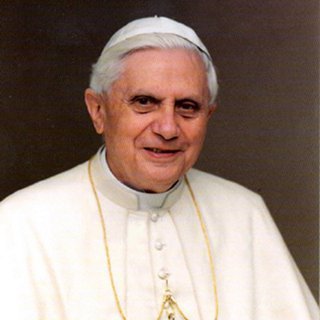
His Holiness Pope Benedict XVI (in Latin Benedictus XVI) was born Joseph Alois Ratzinger on April 16, 1927. He is the 265th and current Pope, the bishop of Rome and head of the Roman Catholic Church. He was elected on April 19, 2005, in the 2005 papal conclave, over which he presided. He was formally inaugurated during the papal inauguration Mass on April 24, 2005.
Pope Benedict was elected at the age of 78, the oldest pope since Clement XII (elected 1730) at the start of his papacy. He served longer as a cardinal before being elected pope than any pope since Benedict XIII (elected 1724). He is the eighth German pope, the last being Adrian VI (1522-1523)
, while the first was Gregory V (996-999). The last Pope Benedict, Benedict XV, was an Italian who served as pope from 1914 to 1922 and reigned during World War I.
Freising; he was subsequently made a Cardinal by Pope Paul VI in the consistory of June 27, 1977. He was appointed prefect of the Congregation for the Doctrine of the Faith by Pope John Paul II in 1981 and was made Cardinal Bishop of the Suburbicarian Church of Velletri-Segni on April 5, 1993. In 1998, he was made Sub-Dean of the College of Cardinals; later, on November 30, 2002, he became the Dean and Cardinal Bishop of the Suburbicarian Church of Ostia, La Candelaria.
He was the first Dean of the College elected Pope since Pope Paul IV in 1555 and the first Cardinal Bishop elected Pope since Pope Pius VIII in 1829. Before becoming pope, Cardinal Ratzinger was already one of the most influential men in the Vatican, and was a close associate of the late Pope John Paul II. He presided over the funeral of Pope John Paul and also over the 2005 conclave in which he himself was elected. He was the public face of the church in much of the sede vacante, although he ranked below the Camerlengo in administrative authority during that time.Benedict XVI’s views appear to be similar to those of his predecessor, Pope John Paul II, in maintaining the traditional Catholic doctrines on birth control, abortion, and homosexuality and promoting Catholic social teaching.
Benedict speaks several languages, including German, Spanish, Italian, English, and Latin. He is also fluent in French and has been an associate member of the French Académie des sciences morales et politiques since 1992.
Early life
Background and childhood (1927–1943)
Joseph Alois Ratzinger was born on Holy Saturday, at 11 Schulstrasse, his parents’ home in Marktl am Inn, Bavaria. He was the third and youngest child of Joseph Ratzinger, Sr., a police officer, and his wife, Maria Ratzinger (nee Riger), whose family were from South Tyrol. His father served in both the Bavarian State Police (Landespolizei) and the German national Regular Police (Ordnungspolizei) before retiring in 1937 to the town of Traunstein.
The Sunday Times of London described the elder Ratzinger as «an anti-Nazi whose attempts to rein in Hitler’s Brown Shirts forced the family to move several times.» . According to the International Herald Tribune, these relocations were directly related to Joseph Ratzinger, Sr.’s continued resistance to Nazism, which resulted in demotions and transfers. The pope’s brother Georg said: «Our father was a bitter enemy of Nazism because he believed it was in conflict with our faith.» . His brother, Georg, who also became a priest as well as a musician and medievalist, is still living. His sister, Maria Ratzinger, who never married, managed her brother Joseph’s household until her death in 1991.
Their grand uncle Georg Ratzinger was a priest and member of the Reichstag, as the German Parliament was called then. The future pope’s relatives agree that his ambitions to reside in the upper echelons of the Church were apparent since childhood. At five years old, Ratzinger was in a group of children who presented the archbishop of Munich with flowers; later that day he announced he wanted to be a cardinal. (See also Early life of Pope Benedict XVI.)
When Ratzinger turned 14 he joined the Hitler Youth, membership in which was legally required from March 25, 1939. According to the National Catholic Reporter correspondent and biographer John Allen, Ratzinger was an unenthusiastic member who refused to attend meetings. Ratzinger has mentioned that a Nazi mathematics professor arranged reduced tuition payments for him at seminary. This normally required documentation of attendance at Hitler Youth activities; however, according to Ratzinger, his professor arranged so that he did not need to attend to receive a scholarship.
